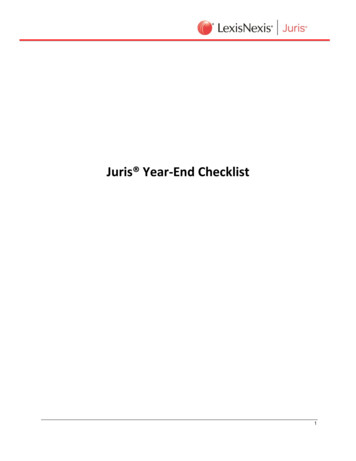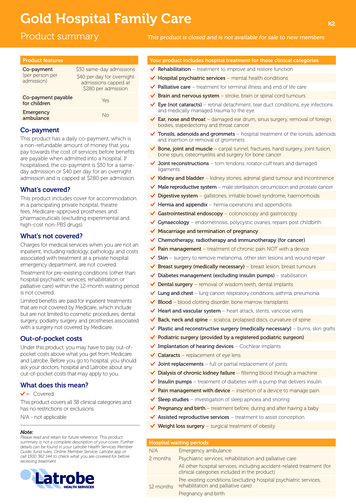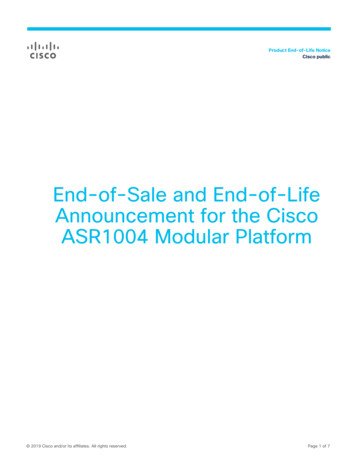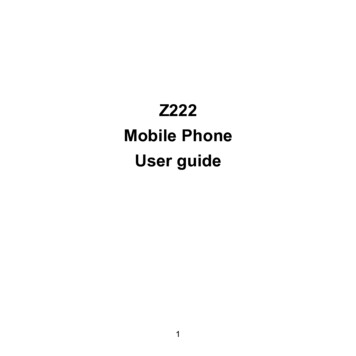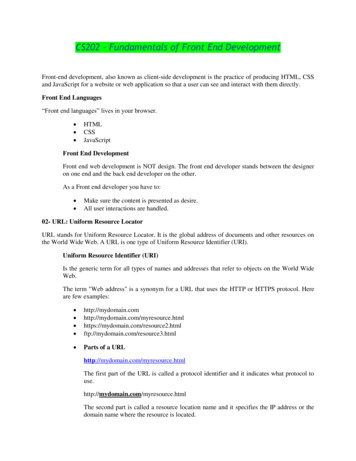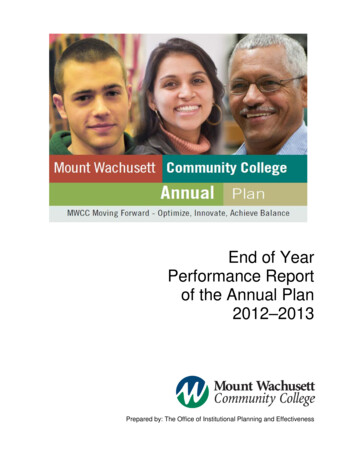
Transcription
End of YearPerformance Reportof the Annual Plan2012–2013Prepared by: The Office of Institutional Planning and Effectiveness
End of Year Performance Report of the Annual Plan 2012-2013TABLE OF CONTENTSPageOverview. 1Statistical End of Year Summary . 1Highlights: FY 2013 Major Accomplishments . 3Highlights: The Vision Project . 10Programs of Distinction . 11Business and Other Collaborations . 13FY 2013 Currently Operating Grants . 16Workforce Training Partners . 20Key Performance Indicators and Metrics Summary: Mount Wachusett Community College’sPerformance Report . 23July 2013i
OverviewMount Wachusett Community College’s Strategic Plan, Moving Forward – Optimize, Innovate, AchieveBalance, sets a well-defined vision and direction for institutional growth and development. The collegebrings its strategic vision, goals, and objectives to life each year through an annual strategic initiativeplanning process. Annual strategic initiatives define for a given year what initiatives have beenapproved that year to advance the college’s strategic vision, goals, and objectives.The FY 2013 (AY 2012-2013) End of Year Performance Report is an analysis of how well the collegeperformed in terms of accomplishing annual initiatives and associated performance metricsestablished in the FY 2013 Annual Plan at the start of the fiscal year.The college’s annual planning process incorporates a formal process for mid-year progress review andend of year assessment of accomplishments and outcomes. Results from the end of year assessmentprovide direction and insight for institutional, divisional, and departmental planning and qualityimprovement.The following section provides a statistical summary of FY 2013 initiatives (by strategic goals andobjectives) completed, still in progress, and not completed. End-of-year reports and an annualinventory of departmental/divisional accomplishments were prepared by executive leaders withthe direct involvement and input of college staff responsible for implementation.Following this statistical summary are highlights of major FY 2013 accomplishments and acomprehensive analysis with dashboard indicator graphs on how well MWCC fared on keyperformance indicators and metrics as year two of the college’s four year strategic plan concludes.Statistical End of Year SummaryThe FY 2013 Annual Plan consisted of 104 strategic initiatives scheduled for completion in fiscal year2013. The college has successfully completed 80 or 76.9% of its initiatives. In addition, another 20initiatives are in progress and on track for completion by end of FY 2013 bringing the college’ssuccessful plan completion rate to 96.2%.Two initiatives slated for FY 2013 could not be completed because they were either reliant on capitalmonies that did not become available or additional operational funds that the budget could notabsorb. Two additional initiatives were not completed as a result of a change in priorities.The chart below provides a quantitative summary by each of the college’s four strategic goals.July 20131 of 44
Overview of FY 2013 Strategic InitiativesTotalInitiativesGoal 1:Quality Teaching& LearningGoal 2:Student Access& SuccessGoal 3:CommunityResponsiveness& Engagement# / % Completed inFY 2013# / In Progress-Will BeCompleted by FY 2014# / % Not CompletedCapital or OperationalFunds Not Available# / % Not CompletedChange in %80202276.9%19.2%1.9%1.9%233312Goal 4:InstitutionalEfficiencies &Effectiveness36Total10496.2%July 20133.8%2 of 44
Highlights: FY 2013 Major AccomplishmentsQuality Teaching and Learning July 2013Redesigned the General Studies degree.Created a faculty committee to review the general education core.Developed a three-year Academic Plan to determine program vitality and allocations ofresources for planned growth in alignment with the workforce needs.Conducted a climate survey of all employees focusing on institutional communication.Implemented text messaging policies and procedures as part of communications plan(emergency/non-emergency and recruitment) with student and employee populations.Assisted Academic Affairs, Lifelong Learning, or other divisions and areas with thedevelopment of a Social Media Manager certificate offering or other credit and noncredit options for FY13 deployment.Expanded healthcare academy from exclusively pre-nursing to include other selectiveprograms such as Dental Hygiene (DHY) and Physical Therapist Assistant (PTA).Investigated, purchased, and implemented web-tool to connect students and jobseekers to careers.Increased Dual and Middle College recruitment in Science, Technology, Engineering, andMath (STEM) field.Assessed and restructured the Medical Assisting and Medical Office curriculum to bettermeet the needs of the students and industry.Devised and piloted an annual summer learning assessment institute for full-timefaculty and staff starting summer 2012. Consider extending this institute into winterworkshops for faculty to regroup and retool assessment strategies. Invite outside guestspeakers including state level assessment experts or other academic peers in specificdisciplines to share assessment practices.Developed a clear and easily accessible user-friendly system of articulation and transferrelated policies and practices.Merged two classrooms into one for better learning environment.Researched feasibility of a Student Social Media club, conduct outreach with currentstudents and propose its creation, if applicable.Promoted student leadership through student-driven service and civic engagementprojects and student center staff.Implemented the Math Emporium Model for the developmental education populationacross campuses.Applied for National Endowment for the Humanities Grant.3 of 44
Articulated Student Life learning outcomes to the college community. Utilized an iconsystem to designate activities denoting those that satisfy the various learning outcomes.Facilitated College Access Challenge Grant’s testing Initiative to provide data back toschool districts in order to inform decisions and adjust curriculum to ensure postsecondary college and career readiness. A unique co-teaching model for mathematicsinstruction will be implemented with the Leominster School District fall 2014 allowinghigh school seniors to master prerequisite math skills prior to enrolling in college-levelcourse work.Renewed the college’s Career/Vocational Technical Articulation Programs with the areahigh schools. Twenty-eight students from the Career/Vocational Technical EducationProgram received college credit upon enrolling at Mount Wachusett Community College(combination of articulated and dual enrollment credit).Student Access and Success July 2013Expanded student support services through completion of student tutoring/library andincreased staffing hours that meet the scheduling needs of day and evening students.Trained advisors in Learning Communities and Barrier Course Redesign in preparationfor course registration.Developed a formulized and integrated communication plan for all enrollment inquiries.Developed an opt-in email marketing and communication plan for prospecting,reengagement, and retention of students.Developed a plan to increase the amount of professional development for adjuncts toinclude assessment of learning outcomes, active learning strategies, and classroommanagement.Completed assessments of all Title III activities to determine effectiveness and impacton student retention.Built past three year catalogs in DegreeWorks program.Expanded use of Business Reply Mail for Student Interest/Response Cards.Increased attendance at student recruitment events.Improved relationships with guidance counselors.Improved service to prospective and current students via communications (telephone,email, instant chat, etc.).Added communication functionality with online instant chat functionality.Improved access by eliminating financial burden on new applicants.Improved new student campus visit experience through more thorough training,organization, and funding of the Student Ambassador Program.4 of 44
July 2013Conducted campus-wide discussions of best practices for academic coordination, acrossmultiple campuses.Evaluated and implemented financial literacy products to improve financial education inVisions/Rx classes.Developed policies and practices to address the needs and concerns of students whohave a status of financial aid suspension (reinstated), probation, or warning.Increased Student Support Services presence by 20% at satellite campuses.Increased enrollment, retention, and graduation rates for student veterans; and assuredthe college's continued commitment to veteran student success.Ensured increase in fall to fall retention rate of Gateway to College (GTC) and CollegeAccess Challenge Grant (CACG) students through intrusive advising practices.Worked with Lifelong Learning to implement developmental labs at the Leominstercampus using the MyFoundationsLab product.Developed assessment of the student use of Gardner Advising Center utilizing newlyformed student tracking forms.Expanded services to satellite campuses in the health services area by 10%.Provided two stress management workshops per semester to students at the Gardnercampus.Worked with academic advising to reduce by 20% student immunization holds at time ofregistration opening.Created English as a Second Language (ESL) tutoring lab on Leominster campus.Reconfigured room usage on the lower level of the library/Academic Student Center(ASC).Implemented the Department of Higher Education Performance Incentive Fund (PIF)grant which provided e-portfolios for the faculty and staff to use with students. Aprotocol for accepting credit for experience was also developed. The college will be aPearson VUE site in July. Catalog software was purchased and will be implemented forfall 2013.Awarded the distinction of being selected as an Advancing a Massachusetts Culture ofAssessment Liberal Education and America’s Promise Study Pilot Campus where samplesof student work will be assessed using the Liberal Education and America’s PromiseWritten Communication, Critical Thinking, and Quantitative Literacy rubrics.Utilized the Massachusetts CIS website to assist in the development of an education andcareer plan for the students in the Adult Basic Education and English for Speakers ofOther Languages classes.Institutionalized Smart Start Registration Events aimed to standardize the informationnew students received in an active-learning environment allowing for mass-studentregistration, while wisely using staff and campus resources.5 of 44
Community Responsiveness and Engagement July 2013Provided monthly workforce performance reports which reflect North Central CareerCenters job seekers and employers demographics.Launched Online Newsroom web page for MWCC news and events.Developed and implemented the patient care technician certificate.Initiated use of targeted, customized communications to recruitment populations.Supported the Trade Adjustment Assistance Community College and CareerTraining(TAACCCT) initiative by building a developmental math/English academic laboratory onLeominster campus.Provided a clear definition of college readiness through implementation of workshopsthat raise awareness of college readiness to students, parents, and school personnel.Developed Memoranda of Understanding (MOU) and/or Partnership Agreements withlocal school districts and community partners with emphasis on top MWCC feederschools.Expanded "A Moment with the Mount" to one additional radio or cable TV venue.Began implementation of new structure for the Center for Democracy and Humanity, tobe known as the Center for Civic Learning and Community Engagement, inclusive ofcontinued quality oversight and implementation of grant-funded programs such asAmeriCorps Job Ready and United Way Youth Venture.Created and maintained the Institutional Research public website and SharePoint thatprovides up-to-date information on student success and programs by end of fiscal year2013.Developed Community Service Learning and Engagement Activities for Access andTransition (A&T) students.Participated as a member of the National Steering Committee for The DemocracyCommitment, providing a voice for Mount Wachusett Community College within thenational conversation in the development of public policy recommendations and thecivic education movement for community colleges.Launched the student-designed and student-run “Students Serving Our Students” (SOS)program, allowing trained student mentors to support their peers in addressing outsidebarriers to education such as housing, transportation, and childcare. More than 450non-duplicated students were served; new and stronger partnerships were forged withoutside social service agencies, allowing for more reciprocal work with students andpartners.Received national recognition for the Fire Science program for adopting national FireScience curriculum, known as Fire and Emergency Services Higher Education, as well asinstituting Live-In Study option for Fire Science Technology (FST) students in local firehouses.6 of 44
Coordinated Mental Health Conference with local partners. Three hundred attendedwhile 100 participated in the conference remotely.Accelerated and delivered the Patient Care Certificate in accordance with theMassachusetts Community College Workforce Development Transformation Agendarequirements. Twenty students successfully completed the program.Partnered with North Central Career Centers to provide skillset enhancing workshopsand instructional seminars to area unemployed seeking reentry to workforce in supportof the Massachusetts Community College Workforce Development TransformationAgenda (TAACCCT).Institutional Efficiencies and Effectiveness July 2013Expanded the use of the procurement card system.Researched option for and implemented a new online payment system.Expanded the use of Finance Self Service.Developed grants based on priorities set by Executive Council and the college’s strategicand annual plan (i.e. Science, Technology, Engineering, and Mathematics (STEM);Student Success; Access & Transition, etc.)Increased the number of new faculty and staff who participate in the grant developmentprocess (i.e. engagement in training; concept paper development; focus group; memberof grant development or grant review team) by 5% from fiscal year 2012.Offered at least two new media professional development sessions for staff, students,or general public.Increased safety and security presence and training on the satellite campuses andincreased community outreach to staff and students.Increased professional development opportunities for managers (and general employeepopulation).Provided Diversity Committee training - specific to committee members and their roleon hiring committees and Division Committee sponsored training of the employeepopulation.Continued payroll initiative to shift individually driven personnel matters to the webportal.Compiled baseline data regarding our current status for recruiting and retention ofhistorically underrepresented populations in relation to the demographics of our servicearea (EEO-1 assessment).Continued to pursue funding, design, and the development of the planning process for anew science building.7 of 44
July 2013Continued to pursue funding, design, and the development of the planning process forresidence halls on MWCC campus.Developed a mobile application proposal based on research conducted in FY 2012.Developed and implemented a new "website improvement and maintenance plan" forcollege's new website launched January 2012 for implementation in FY 2013.Researched digital asset management tools, proposed a solution for the college's digitalasset management, developed a comprehensive digital asset management system, andbegan implementation.Developed an overall 50th Anniversary presence to the website with a dedicated andinteractive anniversary page highlighting celebratory events, college history, and news.Exposed community members to information about MWCC through the 50thanniversary celebration by featuring a wide range of educational and culturalopportunities, activities, and events.Upgraded fire alarm system in fitness center.Finished upgrade to media services facilities to support High Definition VideoEnvironment. At this time half of the facilities are High Definition.Increased the number of multimedia classrooms.Upgraded older multimedia classrooms.Upgraded our in-house video network to support HD video from any location on theGardner campus.Provided two trainings to campus police and other staff as appropriate in mental healthresponse and Title IX reporting requirements.Created TV ads that can be multi-purposed for TV, online/website video, and any richmedia applications.Conducted new media communication and preference surveys with students, staff,faculty, and general public.Implemented use of at least one new social media venue, as identified in FY 2012 goal.Assessed and updated the Graphic Standards Guidelines.Installed hallway emergency phones in three locations on the Leominster campus toprovide faculty, staff, and students with direct access via 9-1-1 to the local policedepartment for emergency response.Implemented active data calendar software to facilitate students signing up for openhouses, testing, and smart start events.Conducted Self Service Time and Attendance (SSTA) training and implemented for fulltime (FT) and part-time (PT) employees.8 of 44
COLLEGE-WIDE INITIATIVESStrategic Planning CommitteeThe Strategic Planning Committee for FY 2015 – FY 2018 was established to oversee thestrategic planning process and actively participate in the strengthening and re-visioning of thecollege’s four year Strategic Plan. As a college-wide ad hoc, advisory work team, sponsored bythe Assembly and president of the college, the committee makes certain that the proposedrevised plan effectively addresses new and emerging environmental changes and realities andclearly identifies key strategic priorities. These priorities will build on relevant institutionalstrengths, correct institutional weaknesses, and ultimately ensure that MWCC is competitivelywell positioned to meet student and service area needs during the four year period, FY 20152018 (July 2014 through June 2018). The 30 member committee met monthly, sometimes twicea month, engaging in opened and candid dialogue, assessed facts, debunked myths, oftencompleting assignments outside of meeting times and, based on a through and thoughtfulassessment, identified and recommended key strategic directions for institutional advancementand effectiveness in the years ahead. The first draft outline of the strategic plan was released inMay for faculty and staff review. A more comprehensive plan will be released in the fall.CLARUS Corporation Focus GroupsMount Wachusett Community College is embarking on the development of a strategic planwhich will address major changes in the educational landscape for 2013-2014 and beyond. Asseen with many other states in the nation, Massachusetts Department of Higher Education hasalso changed the funding formula for its community colleges to focus more on completionrather than enrollment, as historically has been the agenda. CLARUS Corporation returned tofacilitate strategic planning focus groups to assist the Strategic Planning Committee to informand discuss the six key outcomes of The Vision Project. Six planning sessions were held over atwo day period with key members of the college community. Overall, 83 individualsparticipated in the sessions which were held at the Gardner campus, the Leominster campus,and the Devens campus. The goal of the sessions was to explore what the strategic implicationsof the state’s Vision Project will have on the college - how well the college is currentlyperforming on the six outcomes and where the college will have to make changes to fully meetthe expectations of performance. CLARUS Corporation presented their findings in a report tothe Strategic Planning Committee and executive council highlighting three strategic themes:Alignment – aligning with high schools, employers, and others to see success, aligningcurriculum and services to meet student needs, as well as aligning pilot programming within thefabric of the college when it is successful; Advancement – to take all students and move themforward regardless of where they are at educationally, socioeconomically, etc. and to move theCollege and its programming forward into the next decade; and Attainment – having studentsachieve their goals and complete – based on what their goal really was.July 20139 of 44
Highlights: The Vision ProjectThe FY 2013 annual plan has been strategically aligned with the Massachusetts Vision Project andits six outcomes - College Participation, College Completion, Student Learning, WorkforceAlignment, Preparing Citizens, and Closing Achievement Gaps. Alignment of the college’s strategicfocus with the six Vision Project outcomes is critical to the success of our students and theeconomic health of our region and the Commonwealth.The FY 2013 Annual Plan consisted of 104 strategic initiatives. One hundred and two or 43.3% ofall initiatives scheduled for completion in fiscal year 2012 were in alignment with at least one ofthe five Vision Project outcomes.Vision Project OutcomeCollege ParticipationCollege CompletionStudent LearningWorkforce AlignmentPreparing CitizensClosing Achievement GapsNumber of StrategicInitiatives254324631The college has successfully completed 78 or 76.5% of the 102 initiatives in alignment. Another 20are in progress and are expected to be completed by end of FY 2014 bringing the completion rateto 96.1%. Two could not be completed due to lack of funding source and two as a result of achange in priorities. Additionally, 174 accomplishments were reported by department managers ascompleted and in alignment with at least one of the five Vision Project outcomes.The college will continue to require Visions Project outcomes to be incorporated in all FY 2014strategic initiatives for improved alignment and assessment.July 201310 of 44
Programs of DistinctionContinued Accreditation from NEASCMount Wachusett Community College has earned continued 10-year accreditation from theNew England Association of Schools and Colleges (NEASC), which commended the institutionfor its "extraordinary commitment" to students and the region, "entrepreneurial spirit," anddedication to learning and civic engagement under the leadership of President Daniel M.Asquino and an active and committed board of trustees. In its report, the evaluation teamdetermined that MWCC is meeting its mission of teaching and learning excellence, building onstudents' potential for success, maintaining a supportive learning environment, responding tothe community with relevant and quality programs, and instilling in students a sense of civicresponsibility.President's Higher Education Community Service Honor RollMount Wachusett Community College has been named to the 2013 President's HigherEducation Community Service Honor Roll for its strong institutional commitment to service andcampus-community partnerships that produce measurable results for north centralMassachusetts. The Honor Roll, an annual recognition since 2006, is the highest federalrecognition a college or university can receive for its commitment to volunteering, servicelearning, and civic engagement.Top Military Friendly CollegeMWCC has been listed as a top military-friendly college by two organizations, including a newreport that ranked MWCC No. 1 in a review of best career and technical colleges for veterans.Public community and technical colleges accounted for six of the top 10 spots in a new surveyof best skills schools for veterans by Military Times Edge, with MWCC taking the top spotamong career and technical colleges. In addition, for the third consecutive year, MWCC hasbeen named a Military Friendly School by Victory Media, publisher of G.I. Jobs and othermagazines. The 2013 list of Military Friendly Schools honors the top 15 percent of colleges,universities, and trade schools that demonstrate outstanding services for student veterans.National Communications AwardMWCC Vice President of Marketing and Communications Robin A. Duncan has been recognizedwith the national 2013 Communicator of the Year Award by the National Council for Marketing& Public Relations. Duncan, who was named NCMPR District 1 Communicator of the Year lastfall, was selected for the top national award from among the organization's seven district awardJuly 201311 of 44
recipients. The Communicator of the Year Award honors a two-year college marketingprofessional who has demonstrated leadership and ability in college communications.Unsung Hero AwardKristine Larkin, assistant project director of MWCC's Center of Excellence for Veteran StudentSuccess, recently received an Unsung Hero Award from Veteran Homestead, Inc., a Fitchburgbased nonprofit organization that built and operates the Northeast Veteran Training andRehabilitation Center, located on MWCC's Gardner campus, as well as many other services andprograms for veterans. Larkin was recognized for her support and service to VeteranHomestead.July 201312 of 44
Business and Other CollaborationsNortheast Biomanufacturing Center and Collaborative (NBC2)Under a partnership with Montgomery County Community College, Mount WachusettCommunity College will receive funding through a grant from the National Science Foundation.The purpose of this Northeast Biomanufacturing Center and Collaborative (NBC2) project is tocoordinate local and regional efforts into a national biomanufacturing education and trainingsystem to promote, create, and sustain a qualified workforce. The project will build on existingtraining resources established at MWCC and expand the reach of the college’s services bycontinuing its partnership with a major national workforce training initiative in thebiomanufacturing field. The project will provide training and exposure for high school teachersand community college faculty on the growing employment opportunities in biomanufacturing,enabling them to better direct and shepherd students toward this field.Heywood Hospital Suicide Prevention ProgramMount Wachusett Community College has been awarded state funding to provide suicideprevention training to more than 730 Heywood Hospital healthcare employees. MWCC is theonly one of 10 community colleges in Massachusetts awarded two grants totaling 123,073 inRapid Response funding. MWCC and Heywood Hospital will partner to provide healthcareworkers with training in suicide prevention techniques to address a regional concern. Gardnerand its surrounding area have experienced a suicide rate that far exceeds the state average. Thesuicide prevention training, which will increase the likelihood that a patient considering suicidewill encounter an intervention within the healthcare system, will be provided to employeesfrom across the hospital’s system of care, including primary care providers, nurses, and otherallied health workers. The grant program reflects the goals of the Patrick-Murrayadministration’s community college agenda, specifically the commitment to create newopportunities for locally developed, regionally specific jobs and skills training.TerraTherm “Skills Gap” Management TrainingMount Wachusett Community College will be working to support TerraTherm, a growingcompany in Gardner Massachusetts that advises on, designs, builds and operates in situthermal remediation projects from concept to closure. They have diverse skill needs fromengineers to project managers to fabrication workers and field staff. Given its rapid growth,TerraTherm requires training in several different management areas, particularly processimprovement and project management. This training will address “skills gap” training needsthat will explicitly allow for career growth within the incumbent staff at the firm, freeing upJuly 201313 of 44
space for newer job growth. The company estimates hiring ten people in the next year from thegreater Gardner area.Industrial Skills Training and AssessmentMount Wachusett Community College is collaborating with the North Central MassachusettsEconomic Development Council, the North Central Career Center, and area manufacturers todeliver customized industrial skills training designed to solve the industrial skills shortageaffecting local industry. The program has been developed in cooperation with ScientificManagement Techniques (SMT), Inc., the global leader in performance-based skill assessmentsfor industry. SMT's assessment capabilities, together with their demand-driven skills trainingprograms, are used in manufacturing and education organizations in 31 countries to solve theskills shortag
The FY 2013 Annual Plan consisted of 104 strategic initiatives scheduled for completion in fiscal year 2013. The college has successfully completed 80 or 76.9% of its initiatives. In addition, another 20 initiatives are in progress and on track for completion by end of FY 2013 bringing the college's successful plan completion rate to 96.2%.

